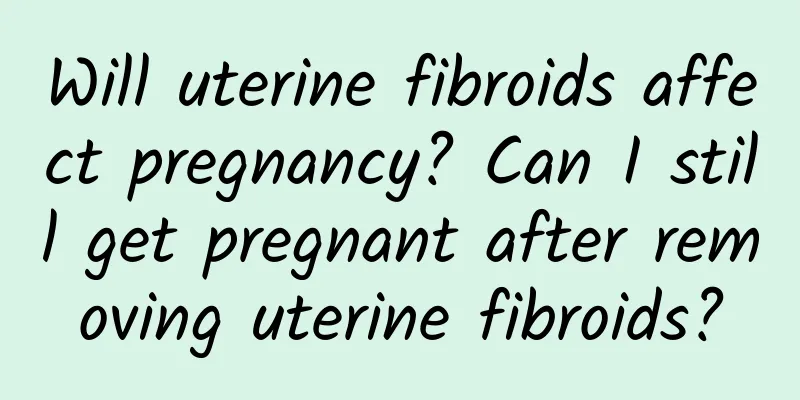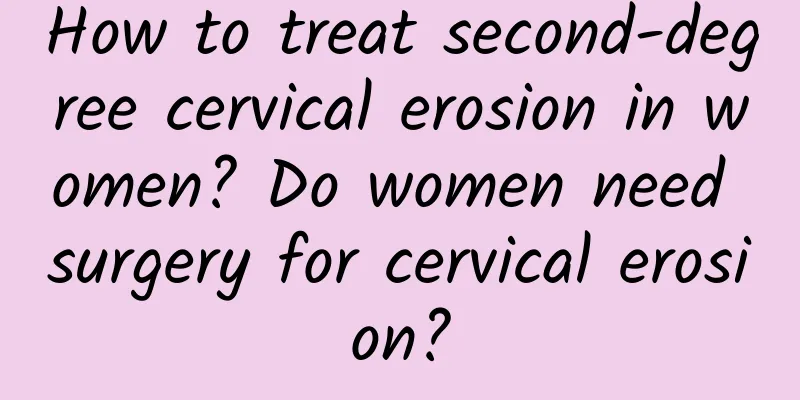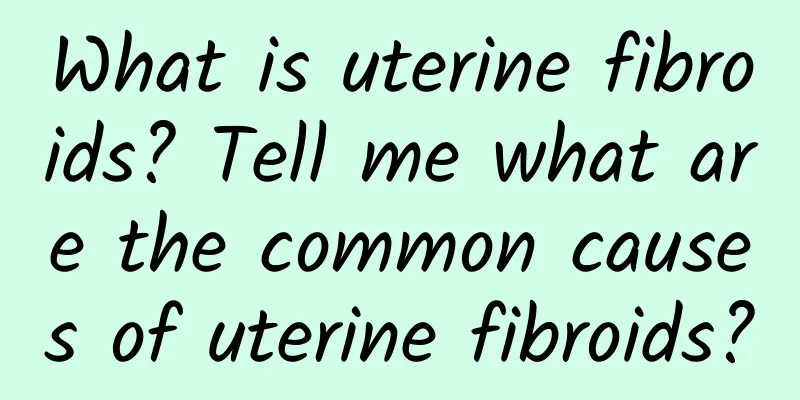Will uterine fibroids affect pregnancy? Can I still get pregnant after removing uterine fibroids?

|
Since most fibroids are benign and most of them are asymptomatic, should they be removed surgically immediately? We should first think about several aspects. For example, in some patients with infertility caused by fibroids, the fibroids may compress the fallopian tubes, may affect implantation in the uterine cavity, and some fibroids growing in the lower half may block the birth canal of the fetus... These women should undergo myomectomy before pregnancy. Surgery may cause another kind of infertility, so those who want to have another child should be careful! However, surgery itself may also cause new adhesions and damage, such as damage to the fallopian tubes or endometrium, causing another kind of infertility. So do you need surgery before getting pregnant? Which surgical method is more suitable? There will be different decisions based on individual conditions, and patients should also understand that hasty surgery may cause more serious infertility. Therefore, when patients are based on the premise of maintaining fertility, they must be more cautious when choosing surgical treatment! There are three commonly used methods of myomectomy: (1) Traditional laparotomy, used for larger fibroids. (2) Laparoscopic surgery is used for smaller serosa myomas. (3) Hysteroscopic surgery, used for submucosal fibroids in the uterine cavity. Uterine fibroids do not increase the risk of premature birth Among women of childbearing age, about 1 in 5 has uterine fibroids, but the vast majority of women only discover they have uterine fibroids during their first prenatal check-up in early pregnancy. Although the chance of encountering uterine fibroids during pregnancy is not small, serious complications are rare (less than 1%). Uterine fibroids will change as pregnancy progresses. Some fibroids will change location, and some will increase in size. Some fibroids are "reddened degeneration" caused by tissue congestion and embolism after pregnancy, leading to abdominal pain and uterine contractions. However, clinical observations and most statistical data confirm that uterine fibroids do not increase the possibility of premature birth. The fetus may be in an abnormal position, increasing the chance of caesarean section. Very few serious complications need to be paid attention to! However, it is undeniable that some larger fibroids affect the turning of the fetus, resulting in an abnormal fetal position; some low-positioned fibroids block the fetal passage, increasing the chance of caesarean section. Only in very rare cases, such as pedicled serosal fibroids with torsion necrosis, immediate surgery is required; or mucosal fibroids cause prenatal bleeding and placental abruption; or fibroids affect postpartum uterine contraction, resulting in postpartum hemorrhage. These serious complications must be paid attention to by obstetricians and gynecologists! Most pregnant women with uterine fibroids can give birth smoothly However, I still want to emphasize that the chance of serious complications is very low, so most of the time, uterine fibroids accompany pregnant women until delivery and do not have a major impact. If a mother has experienced serious complications during pregnancy, such as premature birth, obstructed delivery, or postpartum hemorrhage, she can consider undergoing a myomectomy before the next pregnancy. It is not suitable to remove uterine fibroids during delivery! As for some expectant mothers who think that they can deal with uterine fibroids during cesarean section, this is a very dangerous idea! Because the uterus is congested and enlarged during pregnancy, the peripheral blood flow increases greatly, which is not suitable for treating uterine fibroids; and removing uterine fibroids during cesarean section can easily cause complications such as heavy bleeding and poor uterine contraction, so general obstetricians and gynecologists will not make such suggestions. Follow-up of fibroids 3 months after delivery The cause of uterine fibroids is still a mystery. It may be related to genetic constitution and female hormones (estrogen, progesterone). Because the cause is unknown, it is difficult for us to prevent the occurrence of fibroids or predict future recurrence. After pregnancy, the increase in female hormones in women's bodies should stimulate the growth of uterine fibroids. However, in our clinical observations, we found that uterine fibroids usually maintain their original size or increase slightly during pregnancy. After delivery, due to the decrease in female hormones and reduced blood circulation, there are signs of shrinkage. Ultrasound can be used to track the size of fibroids 3 months after delivery. Uterine fibroids are a common condition for women in their childbearing years. Before pregnancy, you must carefully evaluate whether it will lead to infertility. Do you need surgery? Will surgery increase the chance of infertility? If you discover it after you become pregnant, don't worry too much, because the chance of serious complications is rare. It is important to find a trustworthy obstetrician and gynecologist who understands your condition, communicate fully, understand the advantages and disadvantages of various treatments, and make further appropriate treatments. Only in this way, I believe that uterine fibroids will never be a burden for pregnant women! |
Recommend
Is it normal to have light menstrual flow during breastfeeding?
Small amounts of menstrual flow during lactation ...
Can I go to the hospital alone to have a painless abortion?
It is technically possible to go to the hospital ...
Will ectopic pregnancy cause persistent stomach pain?
Will ectopic pregnancy cause persistent stomach p...
Vulvar itching, yellow vaginal discharge, and increased leucorrhea
Vulvar itching, yellow vaginal discharge, and inc...
What should be paid attention to before uterine fibroid surgery? What are the contraindications of uterine fibroid surgery?
What should patients pay attention to before and ...
What protective measures should be taken in the treatment of ovarian cysts
Ovarian cysts generally have various manifestatio...
Cervicitis is mostly treated with medication
Cervicitis is the most common gynecological disea...
What are the symptoms of uterine fibroids? Common manifestations of uterine fibroids
Many people are actively learning about the sympt...
What symptoms can determine whether you have irregular menstruation?
Women are one of the groups most vulnerable to di...
The most fattening food is stored in this part of the refrigerator...
Guess where in your fridge you tend to store the ...
Pituitary function tests for amenorrhea
There are many examination methods for patients w...
Can dysfunctional uterine bleeding get better? How should it be treated?
As long as they can be treated in a standardized ...
What medicine is good for women with second-degree cervical erosion? Three treatments are recommended for second-degree cervical erosion
Gynecological diseases are diseases that trouble ...
Age is one of the important factors that induce ovarian cysts
The cause of ovarian cysts is closely related to ...
For obese people who want to control their weight, “enjoying thinness” is not a dream! 5 must-eat leptin foods for weight loss
Why do some people never gain weight no matter ho...









